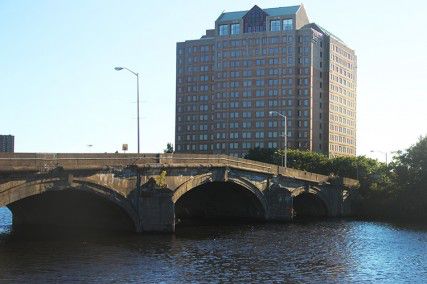
Despite a large state-run bridge repair program, hundreds of bridges both in Boston and in the greater Commonwealth are still in need of significant repair.
The Massachusetts Accelerated Bridge Program has repaired more than 100 bridges since 2008, including the Boston University Bridge, but according to the National Bridge Inventory, 591 of the 4,946 bridges in Massachusetts are classified as “structurally defective.” The Longfellow Bridge by Massachusetts Institute of Technology is in the process of being repaired.
“They [the structurally deficient bridges] are safe for now, but if they lose just one support, they become unsafe for the population,” said Kristina Egan, director of Transportation for Massachusetts, a transportation improvement advocacy group. “Most of our bridges were built along with the highway system under [former U.S. President Dwight] Eisenhower, so they’ve outlived their lifespan.”
Michael Verseckes, spokesman for the Massachusetts Department of Transportation, said funding for transportation projects is difficult to come by because the projects can be so large. However, he said many repairs, namely projects from the Accelerated Bridge Program, are primarily affected by time, not money.
“The funding for the Accelerated Bridge Project is adequate,” he said. “Some bridges we fixed right away because we could. Others are waiting because there had to be some kind of redesign or inspection. For example, you can’t just go and replace Longfellow Bridge. A lot of planning has to go into it. It has a lot of public value, so it takes time.”
Egan said she was happy with how the bridge program money had been spent, particularly regarding the Fast 14 project that replaced 14 bridges in Medford over 10 weekends in the summer of 2011. However, she said she was worried about recent political resistance in favor of repealing a software services tax that was passed in July by the Legislature as a part of a transportation finance bill.
“We’ve only received about half of the money we expected from the state, and now it looks like it’s going to get chopped away even further,” she said. “I know transportation will remain a focus for them [legislators], but they took a huge step forward in July [by passing the transportation bill]. I would hate to see this step back.”
Some people said they were pleased with Massachusetts’s progress on bridge repairs, but others said the government has taken too long to fix a transportation system in disrepair.
“I have no problem with how the government has been handling the bridges,” said David Riley, 25, a resident of Cambridge. “There are some problems I’ve seen, but it feels like they’ve made it a priority to fix them. It’s to save lives, so it just makes sense.”
Mark Stiles, 52, a resident of Milford, said the possible tax cuts only hurt the Commonwealth’s citizens.
“If you take away taxes and do not support the infrastructure, the infrastructure is going to die, and the city’s going to die as a result because that’s how people get in and out of the city,” he said. “You’re trading pennies now for dollars in the long run, and that just doesn’t help anything. It’s not worth it.”
John McCullough, 20, a resident of Boston, said he supported the software services tax repeal, but he still wanted more tax money to go towards road and bridge repair.
“We definitely need better infrastructure here,” he said. “It is nice to have lower taxes, but it’s one of those things that, if we’re not getting the right things done because of it, we’re not doing our job.”






















































































































